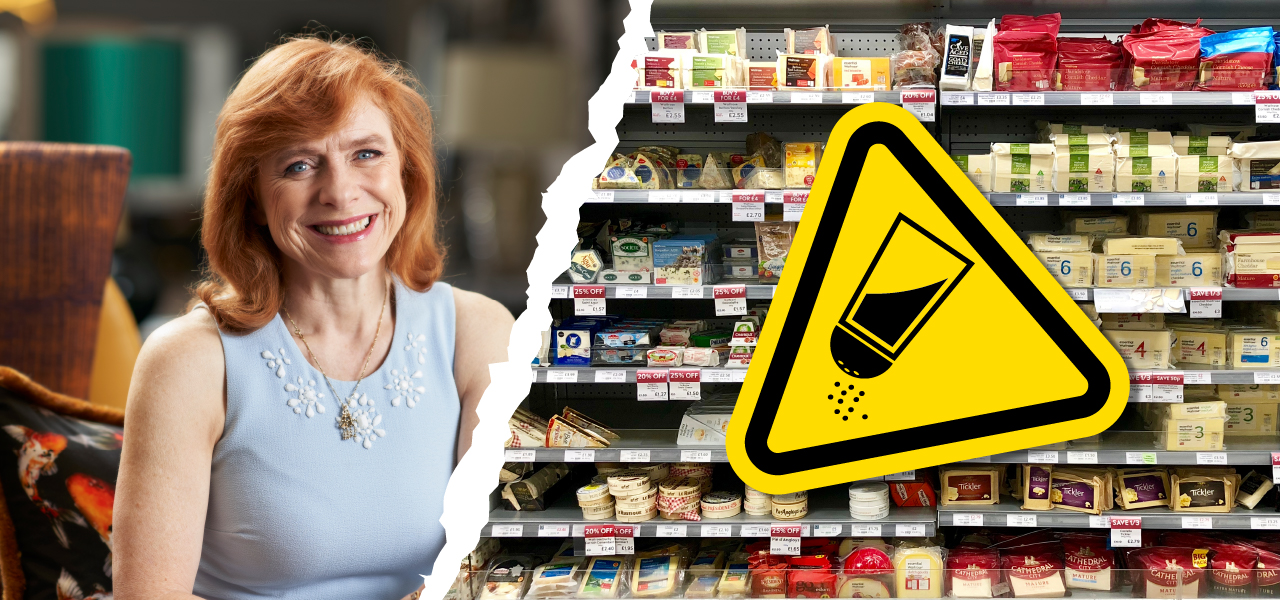17 May 2023

Prevention is better than cure: why we all need to take action on salt now
With new research[1] showing that 45% of people would only cut down on salt if they were diagnosed with an illness that required a diet change, our advisor Dr Sarah Jarvis discusses why this is worrying – and why all of us need to act now, to help our future selves.
Worldwide, an estimated 1.89 million deaths every year[2] are down to too much sodium in our diets. That makes sodium responsible for more deaths than any single other diet-related culprit. Salt is our biggest source of sodium and as a nation we consume far too much. In the UK, it is recommended we consume a maximum of 6g salt (about a teaspoon) a day from all sources in our diets. Instead, on average we are consuming approximately 8.4g a day[3] – 40% more than recommended.
The fact that nearly half of people say they’d only make a change to their salt habits if they ‘really needed to’, is a real concern to me as a doctor. Excess salt can lead to high blood pressure – which in turn, increases the risk of heart disease, heart attack and stroke. Yet 3 in 10 people who have high blood pressure haven’t been diagnosed – that’s 4.2 million people in England alone. In just one age group – mid 50s to mid 60s – there are half a million men in England with undiagnosed high blood pressure[4].
All the time their high blood pressure is untreated and they’re not making lifestyle changes, they’re living with a higher risk of heart attack and stroke. While many people with high blood pressure need medicine to control it, many more could reduce their risk by cutting their salt intake.
The good news is that salt is one of the easiest modifiable factors in your diet. Acting now with small lifestyle changes can have a big impact on your overall health.
Examples of things you can do now that will help include…
- Reading food labels and choosing foods that are colour coded “green” for salt.
- Limiting the consumption of processed foods (such as ready-made sauces, soups, condiments etc) and keeping processed meats to a minimum. Bacon, ham, and sausages all contain salt.
- Cooking from scratch where possible, and using plenty of herbs, spices or lemon juice to flavour your food.
- And seasoning with sense by using a reduced sodium salt
In addition to keeping an eye on salt intake, it’s important we know and understand our blood pressure numbers. High blood pressure is often referred to as the ‘silent killer’ as it rarely causes any symptoms.
If you’re over 40 and aren’t on treatment for high blood pressure, your pharmacist can offer you a free health check which includes a blood pressure check[5]. If it’s high, they can arrange follow-up and let you know what steps to take next.You can also keep an eye on your blood pressure at home with an easy-to-use home blood pressure monitoring device. Keeping a log of your blood pressure can help with an early diagnosis, It can give you feedback about any changes you are making to manage your blood pressure as well, reinforcing your efforts.
It will also highlight whether you need to seek advice that may require additional intervention. Watch my video below to find out more about how salt intake and high blood pressure are linked…
Remember, prevention is always better than cure, and by creating healthy habits today, you can help reduce the risk of wider health problems later in life.
[1] LoSalt 2023 ‘Salt Habits’ research
[2] WHO global report on sodium intake reduction
[3] Public Health England (Page 22) https://assets.publishing.service.gov.uk/government/uploads/system/uploads/attachment_data/file/876252/Report_England_Sodium_Survey_2018-to-2019__3_.pdf
[4] https://www.ons.gov.uk/releases/riskfactorsforundiagnosedhighbloodpressureinengland2015to2019
[5] https://psnc.org.uk/national-pharmacy-services/advanced-services/hypertension-case-finding-service/
